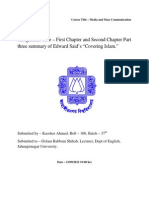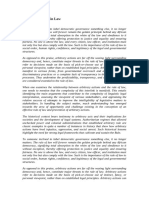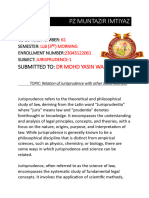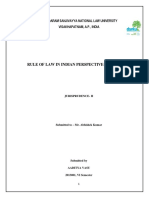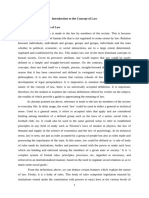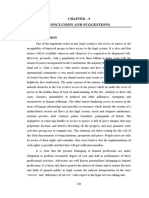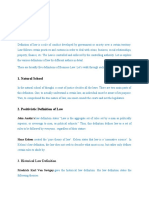17 The Politics of The Rule of Law I
17 The Politics of The Rule of Law I
Uploaded by
Toxic1113Copyright:
Available Formats
17 The Politics of The Rule of Law I
17 The Politics of The Rule of Law I
Uploaded by
Toxic1113Original Title
Copyright
Available Formats
Share this document
Did you find this document useful?
Is this content inappropriate?
Copyright:
Available Formats
17 The Politics of The Rule of Law I
17 The Politics of The Rule of Law I
Uploaded by
Toxic1113Copyright:
Available Formats
17 The Politics of the Rule of Law I From a narrow legal point of view the rule of law consists of a number
of principles such as nulla poena sine lege, that new laws should be publicly promulgated, reasonably clear, and prospective, that judicial decisions should be in accordance with law, issued after a fair and public hearing by an independent and impartial court, and that they should be reasoned and available to the public; and a few others. When we turn from these principles to their institutional and ethical presuppositions the picture becomes less clear. Both the detailed ways in which the principles are understood and implemented and their actual effects vary from country to country. Therefore their moral justification and political significance vary as well. As this essay will make plain, I do not regard the rule of law as a universal moral imperative. Rather it is a doctrine which is valid or good for certain types of society provided they meet the cultural and institutional presuppositions for the rule of law, i.e. those on which the rule of law depends for its success. This should not be understood to mean that the doctrine can be justified in only one way, and that it is valid only for one narrowly circumscribed political culture. Like many other political doctrines (such as that of democratic government) the rule of law, precisely because it varies in details and thrives in a variety of political and cultural environments, can have different meanings and moral justifications in different countries. This essay is about the political significance and the moral justification of the rule of law in one country, Britain. 1 Its conclusions apply to other countries in proportion to the degree to which their political culture is similar to the British one. I find two traditions, two contemporary approaches to the justification of the rule of law. The first regards it as a requirement of formal justice. I will call it the 'justice on a bureaucratic model argument for the rule of law'. The second is the tradition-oriented approach. It emphasizes the aspects of the rule of law which depend on a strong, independent judiciary which is entrusted with the major responsibility for controlling and shaping the development of the law. According to it the common law, i.e. the law as a ____________________ First published in Ratio Juris, 3 ( 1990). 1 In The Authority of Law, ch. 7, I concentrated mostly on the content of the doctrine and on the more universal aspects of its value. -370-
Joseph Raz, Ethics in the Public Domain: Essays in the Morality of Law and Politics. (Clarendon Pres Oxford 1995).
set of judicial practices which has evolved over time and withstood the test of time, is the purest manifestation of the rule of law. My own understanding of the doctrine differs from both these approaches, though it incorporates elements of both. You may think that it is a wishywashy compromise, especially since it does not avoid all the criticism that can be levelled at the other approaches. This kind of imperfect compromise seems to me inevitable when dealing with relatively concrete political doctrines and their attendant institutions. But before explaining and defending my view, I need to say something more about the other approaches. II The argument for the rule of law as an aspect of bureaucratic justice regards compliance with the doctrine as a requirement of fairness. The law should be clearly and publicly laid down for all to see, so that people should be aware of it and will be able to plan their lives accordingly. When any dispute arises they should be able to present their point of view in open court before impartial judges, who come to the case with an open mind and judge by the evidence presented, and give public reasons for their decisions. The emphasis is on predictability, and an ability to conduct one's life without being frustrated by governmental arbitrariness or unpredictability. This view of justice is bureaucratic because it concerns the conduct of bureaucratic institutions in their relations with isolated individuals. So understood, the doctrine concerns law-making and dispute resolution by anonymous strangers inhibiting impersonal institutions based on abstract principles and elaborate procedures. It does more than presuppose this bureaucratic context. It positively requires it. It argues for an implementation of the rule of law in a way which requires elaborate bureaucratic machinery with meticulously observed and policed procedures, which can be relied upon to be fair even when used by anonymous officials, and which require for their success anonymous impartial institutions, inhabited by impartial strangers. This approach contrasts sharply with a view of the law as the common way, the common tradition of the people. This is the ideal of community law. According to it, the need to promulgate the law is no more than a requirement of clarifying its details. The law should be applied by people who rely not only on skills acquired by formal training but on sharing the traditions of the community. They belong to the same community, come from the same background as the litigants, and rely on local knowledge which cannot be proved in court and cannot even be fully articulated in a reasoned judgment. The ideal of community law is upheld by some critics of the rule of law, who point out that on the bureaucratic model the rule of law creates a gulf between the law and the people. Its insistence on reasoned principles and -371-
Joseph Raz, Ethics in the Public Domain: Essays in the Morality of Law and Politics. (Clarendon Pres Oxford 1995).
meticulously observed and elaborate procedures requires the growth of a powerful and specially trained legal profession. This has two major drawbacks. First, it makes justice expensive. The complexity of the legal process required by the rule of law means that to litigate one has to obtain the services of a highly qualified and highly trained professional. Second, as a result of the growth of a legal profession and a highly articulated legal culture, legal issues are formulated in technical terms, caught in legal categories which are far removed from the way ordinary people understand their conduct and interactions with others. The law becomes financially inaccessible and conceptually remote and alienating. It serves the business community, but is unresponsive and unavailable to serve the people. These criticisms should be taken seriously. They do more than point to remediable aspects of our law. They refute any claim that the rule of law is a universal standard of justice. The ideal of community law is a valid ideal for some societies. In those societies the rule of law, far from being a requirement of justice, does more harm than good. The only question is: is the ideal of community law relevant to our societies? The answer is negative. For good or ill, we live in modern industrialized societies which are characterized by high mobility of labour, as people move about in search of jobs, and by a high rate of technological change, fuelled by the needs of capitalism for continuous innovation to make continuous growth possible. In such societies too many people are outside the social support network of stable neighbourhoods and stable customs. Very often they are isolated individuals who will be crushed unless they can rely on the fairness of dealings with strangers under conditions of anonymity. In such conditions the bureaucratic justice of the rule of law is essential. Add to this that we also live in pluralistic societies and the case for the rule of law strengthens. I will address this point later. First let us return to the question: can one avoid the distortions revealed by the criticism of the rule of law? They are real enough. Here the second approach to the rule of law claims to have the answer. It regards the common law as better than communal law. According to it, the common law embodies the legally relevant customs and practices of the country, as tested and refined by the judiciary. On this view, an essential condition of the rule of law is that the law should not express the will or decision of any individual or group. This applies both at the level of the administration and at the level of legislation. There should be no unfettered discretion. All discretion should be guided. All decisions should be merely the concretizing, refining, and developing of established practices and traditions which have proved themselves by withstanding the test of time. On this view, the bearers and protectors of the rule of law are the common-law courts. Legislators and administrators should be kept within narrow bounds, which unfortunately they do not observe. -372-
Joseph Raz, Ethics in the Public Domain: Essays in the Morality of Law and Politics. (Clarendon Pres Oxford 1995).
I find this version of the ideal of the rule of law deeply unsatisfactory. It too may be an ideal for a homogeneous society undergoing little social change. But it is totally inadequate for societies which are in a process of fast social change, including a high rate of social and geographical mobility, and a continuous emergence of new forms of occupational and social organization, with their attendant moral consequences. The evolution of social and judicial practices is too slow a process to respond adequately to such trends. I am not saying that judicial practices are totally unresponsive to such changes, only that their response, welcome as it is, is necessarily inadequate. These difficulties are compounded when the society concerned is pluralistic rather than homogeneous. In homogeneous societies everyone, the judiciary and the people, shares, broadly speaking, the same culture and the same values. In pluralistic societies, broken up into ethnic, religious, or economic groups, this is often not the case. Different sections of the population have different cultures and value systems. Usually there is also an overlap. But while the overlap may be enough to sustain a civil society united in its rejection of treason and the major crimes of violence and crimes against property, it is usually insufficient to provide a common understanding of the justice of various ways of organizing family life and other personal relations, of the justice of the economic structure of the state or its civil liberties. Therefore pluralistic societies fail to have enough shared practices to sustain the rule of law understood according to the second approach. All they have are divergent practices for their different constituent, sometimes overlapping, but sometimes segregated, groupings. In pluralistic societies the law is often required to adjudicate between subcultures, to set a limit to their autonomy, to the measure of toleration they are entitled to from other subcultures, and to the measure of common standards to which all subcultures in a society should conform. Reliance on common or judicial practices in such societies is likely to lead to evil and oppression. It is likely to favour ite groupings at the expense of others. The reason is that social processes inevitably lead to an overidentification of the judiciary with the (or part of the) lite group in society. Given that sensitivity to the point of view of a certain group or culture cannot be reliably secured except by its members, or people who closely interact with them, the second approach of the rule of law is not an ideal in a pluralistic society. III So we finally come to the third view of the rule of law, which finds its core idea as principled faithful application of the law. Its major features are its insistence on an open, public administration of justice, with reasoned -373-
Joseph Raz, Ethics in the Public Domain: Essays in the Morality of Law and Politics. (Clarendon Pres Oxford 1995).
decisions by an independent judiciary, based on publicly promulgated, prospective, principled legislation. On this understanding, the principle of the rule of law is directed primarily at the judiciary and other subordinate legal institutions such as the police, prosecution service, and administrative authorities. It directs them to apply statutory and common law faithfully, openly, and in a principled way. The principle of the rule of law also applies to the legislature, and directs it (and the courts to the extent that they develop and change the law) to make laws which could be faithfully applied, i.e. to make them reasonably clear in formulation, and coherent and transparent in purpose. It also directs them to establish and maintain a system of courts, and other legal institutions, which are capable of observing the requirements of the rule of law. The difference between this view of the rule of law and the second approach is its greater emphasis on the role of legislation. The precise constitutional contribution of the doctrine of the rule of law to the political culture of a society depends on its political organization. In the following remarks I will be assuming a democratic, non-federal constitution. The reason for the importance of legislation in modern societies is that democratic legislation seems essential for the adequate government of a pluralistic society in a continuous process of social and economic change. I am referring here, of course, to my earlier observation about the results of pluralism and change. Only democratic politics can be sufficiently sensitive to the results of change, and only democratic politics can respond adequately to the different interests and perspectives of different subcultures. You may think that, on my understanding, the rule of law has a simple relationship to democratic government. It makes the legislature supreme. But this is far too simple a view. Mine is not the theory that courts should have no share in making and developing the law. I am an advocate, not an opponent, of both judicial discretion and judicial power to set precedents, which between them give the courts considerable law-making power. There are two ways in which this view of the rule of law reinforces democracy. On the one hand it requires legal institutions to be loyal to legislation emerging from a democratic legislature, thus enhancing its power. But the rule of law also sets limits to majoritarian democracy, represented in the legislature. It requires principled, as well as faithful, adjudication. This point requires a little amplification. Principled decisions are reasoned and public. As such they become known, feed expectations, and breed a common understanding of the legal culture of the country, to which in turn they are responsive and responsible. The courts are not formally accountable to anyone, but they are the most public of governmental institutions. They are constantly in the public gaze, and subject to public criticism. Thus their decisions both mould the public culture by which they are judged and are responsive to it. The requirement of public, principled -374-
Joseph Raz, Ethics in the Public Domain: Essays in the Morality of Law and Politics. (Clarendon Pres Oxford 1995).
justification is not a demand for great philosophical sophistication. On the whole, judges who become philosophically ambitious are bad judges. The requirement is for justification in terms of the common legal culture of the country concerned. It is a requirement for justification by reference to the common values and shared practices of the legal culture.Do I now contradict my earlier criticism of an exclusive reliance on judicial practices in a changing pluralistic society? I do not think so. The common legal culture I am now referring to is shaped by legislation as much as by judicial practices. It is a legal culture responsive to the democratic impulse. But it is a culture created over time, and evolving very slowly. In insisting that judicial decisions should be not only faithful but also principled, I am suggesting that the function of the rule of law is to facilitate the integration of particular pieces of legislation with the underlying doctrines of the legal system. A particular piece of consumer-protection legislation, let us say, should be applied faithfully, to give effect to the legislative purpose, and in a principled way, that is, in a way consistent with the underlying doctrine of contract law. A particular reform of police powers to search for prohibited drugs, to take another example, should be applied in a manner which is both faithful to the legislative purpose and principled in integrating it with traditional doctrines of the liberties of the citizen.Since not infrequently integration in the existing legal culture will conflict with the interpretation which is most faithful to the legislature's intent, this view of the rule of law assigns the courts an active role in interpreting the law, and a role which may appear to be undemocratic. The courts are required to tame the democratic legislature in the light of existing legal doctrine. In fact, far from being undemocratic, it encapsulates the second way in which the rule of law underpins democracy.The authority of the courts to harness legislation to legal doctrine arises neither from their superior wisdom nor from any superior law of which they are the custodians. Rather it arises out of two considerations. 1. In bringing legislation into line with doctrine, the courts ensure coherence of purpose in the law, ensuring that its different parts do not fight each other. 2 A law which is incoherent in purpose serves none of its inconsistent purposes very well. In saying this I distinguish between conflicting and inconsistent purposes. Purposes conflict if, owing to the contingencies of life, serving one will in some cases retard the other. Purposes are inconsistent if their conflict is logical. Pluralistic societies always espouse conflicting values. But no rational society should entertain inconsistent ones. The desire to enable women to pursue independent careers conflicts with the need to preserve the family bond, and calls for compromises. But the desires to allow divorce on demand and ensure the indissolubility of marriage are ____________________ 2 See ibid. ch. 10. -375-
Joseph Raz, Ethics in the Public Domain: Essays in the Morality of Law and Politics. (Clarendon Pres Oxford 1995).
inconsistent. The courts continuously interpret statutes and refashion doctrine to avoid incoherencies, and to turn them into conflicting values which are amenable to compromise. 3 The second basis for the authority of the courts to integrate legislation with doctrine is the need to mix the fruits of long-established traditions with the urgencies of short-term exigencies. Legislatures, because of their preoccupation with current problems, and their felt need to secure re-election by a public all too susceptible to the influences of the short term, are only too liable to violent swings and panic measures. Those effects are mitigated by the courts as guardians of the tradition.
There is no denying that both these justifications are anti-majoritarian. But then, no cogent political theory has ever found much merit in majoritarianism. The two justifications are, however, democratic in a deeper sense. In ensuring the coherence of the law they ensure the effectiveness of democratic rule. In giving weight to the preservation of long-established doctrines (= traditions), they protect the long-term interests of the people from being swamped by the short term. In doing whatever they do in a reasoned and public way, they make themselves susceptible to public criticism, and therefore to indirect public influences, and this, together with their being ultimately subject to the power of the legislature, guarantees their ultimate accountability. There is one apparent omission from this account of the rule of law which may surprise some readers. I have said nothing about the importance of the protection of basic civil rights to the rule of law. This is not because the rule of law can flourish while basic civil rights are violated. It is because their protection is partly presupposed and partly implied by the points made above. Since my discussion of the moral and political significance of the rule of law is confined to its function in democratic societies, those political and civil rights without which no democracy can prosper are here presupposed. Since the rule of law assures individuals of bureaucratic justice, it implies conformity with many civil rights which guarantee the fair process of the law. Finally, and most importantly, in insisting on the integration of legislation and other current measures with legal tradition enshrined in doctrine, the rule of law respects those civil rights which are part of the backbone of the legal culture, part of its fundamental traditions. I would not deny that this way of breaking up the application of the rule of law to civil rights is itself significant. It attests to a reluctance to give them pride of place in the legal culture, and its morality. It implies a claim that they should be seen as historically conditioned, and as fulfilling a variety of roles, the most important of which may be as an element in the fundamental legal tradition of a country, an element among others. 3 ____________________ 3 The Morality of Freedom, ch. 10. -376Joseph Raz, Ethics in the Public Domain: Essays in the Morality of Law and Politics. (Clarendon Pres Oxford 1995).
We now see that my picture of the rule of law is not altogether unrelated to the second approach which I criticized above. The rule of law functions in modern democracies to ensure a fine balance between the power of a democratic legislature and the force of tradition-based doctrine. In guaranteeing this balance lies its value as an element in the doctrine of good government. In curtailing arbitrary power, and in securing a wellordered society, subject to accountable, principled government, lies the value of the rule of law. IV As was indicated at the outset, formally speaking the rule of law is observed whenever a small number of principles is respected, like public promulgation, no punishment without law, no retroactivity (generally speaking), clarity of law, avoiding free discretion in favour of guided discretion, by the administration and the courts. I have emphasized the political significance of these principles in (some) contemporary democracies. I have argued that in such societies the rule of law encapsulated in the idea of principled decision-making is essentially a device for the separation of powers. On the one hand it requires judicial faithfulness to legislature, reigning in the forces of the court and the executive. On the other hand it calls on the courts to act to integrate legislation and doctrine, a task which requires independence and ability to withstand political pressures. It should be clear that these benefits of the rule of law are valuable, and obtainable only in countries with certain practices and traditions. The first and most important is that the country must be suitable for democratic government. This demands above all a culture of restraint and willingness to compromise. It requires a spirit of restraint and compromise on the part of the current minority, which has to submit to policies which go against its interests and beliefs, and it requires a spirit of restraint and compromise by the majority, which has to avoid taking advantage of its current dominance in a way which disregards the interests and beliefs of the current minorities. But this is obviously not the occasion to elaborate on the cultural presuppositions of democracy. So let me turn to the second presupposition, which is the existence of a strong and independent judiciary, legal profession, and civil service. We often emphasize the importance of an independent judiciary. But it is crucial to remember that it can be independent only if it is supported by a strong and independent legal profession. A politically manipulable legal profession can subvert the rule of law just as much as weak and politically manipulable courts. In addition one requires an independent civil service, owing allegiance first to the law and only under the law to the government -377-
Joseph Raz, Ethics in the Public Domain: Essays in the Morality of Law and Politics. (Clarendon Pres Oxford 1995).
of the day. Again, the ways in which a corrupt police force or civil service can undermine the rule of law are too numerous and too obvious to require elaboration. Finally, to sustain the independence of the courts, police, legal profession, and civil service, one requires a pervasive common culture, bridging the differences between the subcultures of the country. One requires a culture of legality, of respect for the law, and a willingness to abide by it even when one loses by it. To be viable, this means a culture in which people are accustomed to measure their situation, and their relations to others, in legal terms. They may think of their needs, and of their rights, in the light of the norms of their subculture, or of their own moral views, but they accept that when disagreements arise, and have to be settled by public authorities, the law provides the common measure of right and wrong in the country. V My remarks were meant to show the value of the rule of law in a fast changing pluralistic society. I emphasized two virtues: Bureaucratic justice, the protection of the individual in anonymous social surroundings; Democratic continuity. I also argued that these virtues can only be achieved in a country with a democratic culture, and a culture of legality with a tradition of independence for the courts, the legal profession, the police, and the civil service. It is not an ideal which can be secured by passing a few statutes. It is also not an ideal free from blemish. It brings in its wake the problems of denial of effective access to the courts, and of alienation from the law. To some extent there is no escape from these blemishes. We have to be chastened by an awareness of their existence, do our best to minimize them, and be modest in our pride in the rule of law. -378-
Joseph Raz, Ethics in the Public Domain: Essays in the Morality of Law and Politics. (Clarendon Pres Oxford 1995).
You might also like
- Travel Order and IteneraryDocument2 pagesTravel Order and IteneraryMpgmhl C John Lyndon100% (2)
- Bonifacio-Magallona - A Study On The Legal ProfessionDocument4 pagesBonifacio-Magallona - A Study On The Legal ProfessionBrian Kelvin PinedaNo ratings yet
- Covering Islam SummaryDocument17 pagesCovering Islam SummaryKaosher AhmedNo ratings yet
- Scepter & StarshipDocument5 pagesScepter & Starshipansweringthecal100% (3)
- 128 BSanket Jamuar VJurisprudenceDocument12 pages128 BSanket Jamuar VJurisprudenceyash anandNo ratings yet
- An Essay With A Title That Is Yet To Be DeterminedDocument4 pagesAn Essay With A Title That Is Yet To Be DeterminedhardricandronicusNo ratings yet
- Between Facts and Norms An Author's ReflectionsDocument7 pagesBetween Facts and Norms An Author's ReflectionsDi StovallNo ratings yet
- Building A Law-Abiding Society: Taking Public Views About Morality and The Legitimacy of Legal Authorities Into Account When Formulating Substantive LawDocument34 pagesBuilding A Law-Abiding Society: Taking Public Views About Morality and The Legitimacy of Legal Authorities Into Account When Formulating Substantive LawOmang LattotNo ratings yet
- The Dialectics of Law - Chhatrapati SinghDocument11 pagesThe Dialectics of Law - Chhatrapati SinghPranav Kumar VasishtaNo ratings yet
- Criminal Week 1Document52 pagesCriminal Week 1IvyChang14No ratings yet
- Legitimacy and Justice in RepublicanDocument24 pagesLegitimacy and Justice in RepublicanrzsxNo ratings yet
- Introduction To LawDocument6 pagesIntroduction To LawGisela Dwi Christina RumawasNo ratings yet
- The Cause of Popular Dissatisfaction With The Administration of JusticeDocument14 pagesThe Cause of Popular Dissatisfaction With The Administration of JusticePaolo FogliaNo ratings yet
- Model Answers - EngDocument20 pagesModel Answers - EngWRESTLE BANKNo ratings yet
- THE Women OF Aleitheia: Truth Honor ExcellenceDocument33 pagesTHE Women OF Aleitheia: Truth Honor ExcellenceLilette28100% (2)
- Chapter 5 Law Morality and JusticeDocument12 pagesChapter 5 Law Morality and Justicewavid56No ratings yet
- Law & Social TransformationDocument228 pagesLaw & Social TransformationAAKASH KUMARNo ratings yet
- Understanding Law and Economics, A Primer For Judges by Lourdes Sereno, Associate Professor, UP College of LawDocument11 pagesUnderstanding Law and Economics, A Primer For Judges by Lourdes Sereno, Associate Professor, UP College of Lawlocusstandi84No ratings yet
- An Assignment Law and Justice in Globalised WorldDocument41 pagesAn Assignment Law and Justice in Globalised Worldabhinandan it pandey100% (2)
- Arbitrary Actions in LawDocument10 pagesArbitrary Actions in Lawninim82344No ratings yet
- Randall PeerenboomDocument13 pagesRandall PeerenboomFagun SahniNo ratings yet
- Peerenboom - 2004 - Asian Discourses of Rule of Law Theories and ImpleDocument5 pagesPeerenboom - 2004 - Asian Discourses of Rule of Law Theories and ImpleHrushikesh KattemaneNo ratings yet
- Various Definitions of LawDocument10 pagesVarious Definitions of Lawbgjt.susovanNo ratings yet
- Law and SociologyDocument7 pagesLaw and SociologyGuntejNo ratings yet
- Law N Morality Pol SC ProjctDocument14 pagesLaw N Morality Pol SC ProjctSumathy AsviniNo ratings yet
- Philosophy of LawDocument3 pagesPhilosophy of LawRussell Danica Sue100% (2)
- Law and MoralityDocument14 pagesLaw and Moralityharshad nickNo ratings yet
- jurisprudenceDocument11 pagesjurisprudenceBOYKANo ratings yet
- Mercy What Is LawDocument6 pagesMercy What Is LawMercy NamboNo ratings yet
- The Role of Law in SocietyDocument4 pagesThe Role of Law in SocietySheryar NaeemNo ratings yet
- Interrelationship of Law & SocietyDocument7 pagesInterrelationship of Law & Societyriakumari2121No ratings yet
- Law and Morality ProjectDocument8 pagesLaw and Morality ProjectManikanta MahimaNo ratings yet
- Judicial Accountability in Comparative PerspectiveDocument18 pagesJudicial Accountability in Comparative PerspectiveMarildaPsilveiraNo ratings yet
- SSRN Id2012845Document16 pagesSSRN Id2012845nurfatiyah nasirNo ratings yet
- Business LawDocument78 pagesBusiness LawEvangelist Kabaso Sydney100% (1)
- OUMM3203Document11 pagesOUMM3203Rozita Abdullah SaniNo ratings yet
- UNIT 4 (Cont,) THE INTER-RELATIONSHIP BETWEEN LAW AND SOCIETYDocument8 pagesUNIT 4 (Cont,) THE INTER-RELATIONSHIP BETWEEN LAW AND SOCIETYvibiwef714No ratings yet
- Rule of Law Under Indian PerspectiveDocument16 pagesRule of Law Under Indian PerspectiveAadityaVasuNo ratings yet
- An Essay of Law, Justice and MoralityDocument4 pagesAn Essay of Law, Justice and MoralityFelipe Eduardo Socualaya CamposNo ratings yet
- Law N Morality - Pol SC ProjctDocument25 pagesLaw N Morality - Pol SC ProjctNitesh JindalNo ratings yet
- Introduction to the Concept of Law 1 (1)Document12 pagesIntroduction to the Concept of Law 1 (1)imaikopjnr15No ratings yet
- Lecture NotesDocument10 pagesLecture NotesDenisi ShirimaNo ratings yet
- Torts Notes (Sonsie)Document213 pagesTorts Notes (Sonsie)Ansh AroraNo ratings yet
- Legal Theory 1st GCT 1Document10 pagesLegal Theory 1st GCT 1MOHAMAMD ZIYA ANSARINo ratings yet
- Article ILI FinalDocument26 pagesArticle ILI FinalSiddharthSharmaNo ratings yet
- Sociology of LawDocument22 pagesSociology of LawPramodNo ratings yet
- The relationship between Law and Society Riara lectureDocument11 pagesThe relationship between Law and Society Riara lecturesnillocobmaihdo7No ratings yet
- Classic Legal Theorizing Lecture Notes F23Document11 pagesClassic Legal Theorizing Lecture Notes F23Ryan ADNo ratings yet
- Raz - The Law's Own VirtueDocument15 pagesRaz - The Law's Own VirtueLuis Javier SalasNo ratings yet
- 12 Chapter - 5Document22 pages12 Chapter - 5project wordNo ratings yet
- Chapter 1-Introduction and Research Methodology A.: A Theory of Justice by John RowlsDocument21 pagesChapter 1-Introduction and Research Methodology A.: A Theory of Justice by John RowlsIshwarNo ratings yet
- Law & Justice DRAFTDocument21 pagesLaw & Justice DRAFTIshwar100% (1)
- Introduction To JurisprudenceDocument7 pagesIntroduction To JurisprudenceSakitharaniNo ratings yet
- Law and Order and Popular JusticeDocument3 pagesLaw and Order and Popular JusticeaiobundleNo ratings yet
- Rule of Law by TaiwoDocument3 pagesRule of Law by TaiwoBernice Purugganan AresNo ratings yet
- Law_in_The_International_CommunityDocument3 pagesLaw_in_The_International_CommunityMHmza ZmnNo ratings yet
- INTRODUCTION TO THE STUDY OF LAW PereznietoDocument18 pagesINTRODUCTION TO THE STUDY OF LAW PereznietoScribdTranslationsNo ratings yet
- JurisprudenceDocument87 pagesJurisprudencekajukatripic1No ratings yet
- Habermas Between Facts and NormsDocument7 pagesHabermas Between Facts and Normsfrancisca grandaNo ratings yet
- CRL 1012Document5 pagesCRL 1012nicole.mifsud.22No ratings yet
- Introduction About Law and MoralityDocument6 pagesIntroduction About Law and MoralityDivya YadavNo ratings yet
- Building A Law-Abiding Society - Taking Public Views About MoralitDocument35 pagesBuilding A Law-Abiding Society - Taking Public Views About MoralitRobbie BlaineNo ratings yet
- Public Law: Foundations Governance and Justice in Modern SocietiesFrom EverandPublic Law: Foundations Governance and Justice in Modern SocietiesNo ratings yet
- Artifact 6Document2 pagesArtifact 6api-383167103No ratings yet
- America Is in The HeartDocument5 pagesAmerica Is in The Heartdek koshibaNo ratings yet
- Part 2 ReportingDocument13 pagesPart 2 ReportingRUEN P. LOMONo ratings yet
- Germania, Proiect Iulia CraciunDocument5 pagesGermania, Proiect Iulia CraciunElenaNo ratings yet
- Dutertismo and Philippine DemocracyDocument3 pagesDutertismo and Philippine DemocracycazzmereNo ratings yet
- Riph Reviewer1 1Document12 pagesRiph Reviewer1 1KRISTINE ANNE TOMBOCNo ratings yet
- Creative Community Planning in An Era of Austerity: The Westfield International Planning ConferenceDocument2 pagesCreative Community Planning in An Era of Austerity: The Westfield International Planning Conferenceapi-244437023No ratings yet
- Anna Louise Strong - The Stalin Era-Today's Press (1956) PDFDocument123 pagesAnna Louise Strong - The Stalin Era-Today's Press (1956) PDFAlwin PaviNo ratings yet
- Anh gk2Document5 pagesAnh gk2Diêm Công LĩnhNo ratings yet
- (1900) in Memoriam, Garret Augustus Hobart, Vice PresidentDocument46 pages(1900) in Memoriam, Garret Augustus Hobart, Vice PresidentHerbert Hillary Booker 2ndNo ratings yet
- Miami-Dade Homeless Trust Board Roster 27 Board Members Greater Miami Chamber of CommerceDocument5 pagesMiami-Dade Homeless Trust Board Roster 27 Board Members Greater Miami Chamber of Commerceal_crespoNo ratings yet
- GERARDO KAREN TRABAJO - FINAL FILOSOFIA GRUPO - 3 With Cover Page v2Document16 pagesGERARDO KAREN TRABAJO - FINAL FILOSOFIA GRUPO - 3 With Cover Page v2Marisol AquinoNo ratings yet
- Religion in The Public Sphere - The Holberg Prize Seminar 2005Document139 pagesReligion in The Public Sphere - The Holberg Prize Seminar 2005idacama100% (3)
- Pakistan S MCQSDocument12 pagesPakistan S MCQSARSLAN HUSSAInNo ratings yet
- Analisis Dan Perancangan E-Goverment Dalam Transparansi Sistem Pemerintahan Desa (Studi Kasus: Desa Tenjo Layar Dan Desa Tanjung Sari Majalengka)Document13 pagesAnalisis Dan Perancangan E-Goverment Dalam Transparansi Sistem Pemerintahan Desa (Studi Kasus: Desa Tenjo Layar Dan Desa Tanjung Sari Majalengka)Satria SuryaNo ratings yet
- William A. Christian Jr. Visionaries The Spanish Republic and The Reign of Christ 1999Document508 pagesWilliam A. Christian Jr. Visionaries The Spanish Republic and The Reign of Christ 1999Juan Jose Sanchez100% (1)
- Sardar Vallabhbhai PatelDocument3 pagesSardar Vallabhbhai Pateljigarpatel138100% (1)
- Kontra Daya Vs Kasangga Complaint As Filed Before ComelecDocument17 pagesKontra Daya Vs Kasangga Complaint As Filed Before ComelecRG CruzNo ratings yet
- Senior High School Forms - NewDocument23 pagesSenior High School Forms - NewMari Lou100% (4)
- Eduardo Galeano: WorksDocument3 pagesEduardo Galeano: Worksa30402No ratings yet
- Political Science 100Document33 pagesPolitical Science 100Frederick W Gomez50% (2)
- Programmes and Achievements of The Early NationalistsDocument4 pagesProgrammes and Achievements of The Early NationalistsAvi MathNo ratings yet
- Least Learned Skills With Test Questoinnaire 1 Quarter: Sta. Elena Elementary SchoolDocument3 pagesLeast Learned Skills With Test Questoinnaire 1 Quarter: Sta. Elena Elementary SchoolLinrose Go ReynaNo ratings yet
- (Note 9)Document1 page(Note 9)Rashveen Raaj SandirasekarNo ratings yet
- TFOEPE-Form-No.-1-Eagles-Membership-Form 2Document2 pagesTFOEPE-Form-No.-1-Eagles-Membership-Form 2Clarisse30No ratings yet
- Lao People's Revolutionary Party (LPRP)Document9 pagesLao People's Revolutionary Party (LPRP)Nica joy SantelicesNo ratings yet
- The Standard of Civilisation' in World Politics - LinklaterDocument17 pagesThe Standard of Civilisation' in World Politics - LinklaterDanielNo ratings yet


